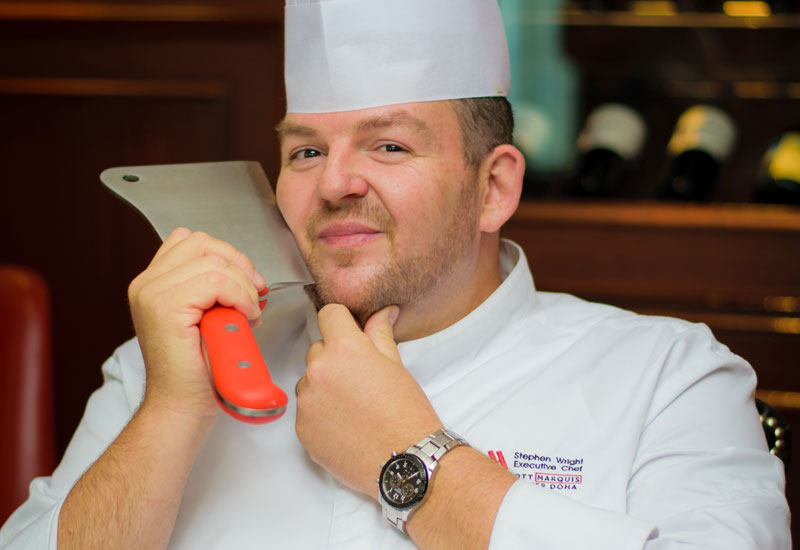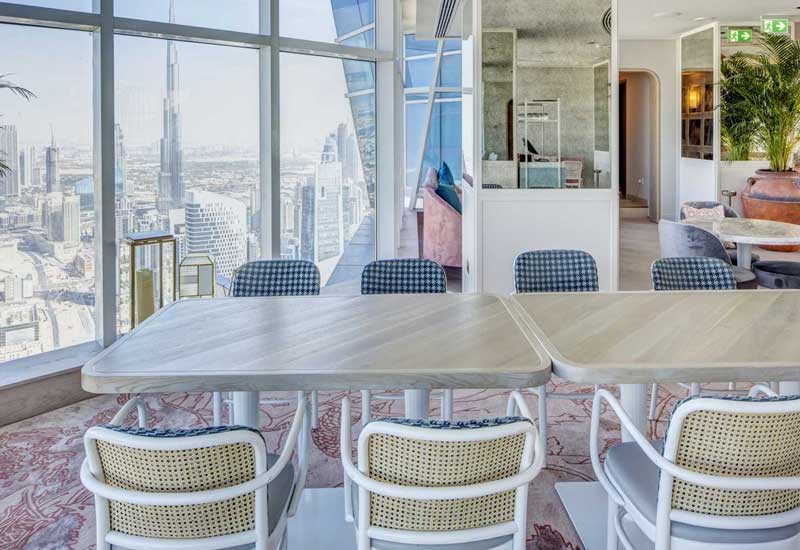In his awards nomination, Stephen Wright’s colleagues described him as an “inspirational leader” with an infectious sense of fun, who makes coming to work exciting; a man who balances creativity, business acumen and a customer-first approach.
So who is this executive chef par-excellence who attracts the love and loyalty of his team, the respect of his peers and the admiration of his bosses? The affable Australian puts down his knives and spreadsheets for a minute to meet with Caterer Middle East to explain his methods.
“I’ve been here for 18 months now, and have a great team of senior and junior chefs,” he says, immediately deflecting some of the glory of his victory to the wider Marriott Marquis Doha dining team.
“When I arrived I was lucky or unlucky enough to find that most of the senior chef positions were vacancies — we had no New York Steakhouse chef, no Ipanema chef and no Cucina chef, and our Crossroads Kitchen chef was in the process of leaving.

| Advertisement |
“Some outlets didn’t have demi chefs and some didn’t have commis. So we put a proper structure in each outlet. We got to start fresh,” he reveals.
Wright insists the process of team development is ongoing, saying: “We’re still identifying talent and having honest conversations. And I like to move people around. I will promote within an outlet if someone is dedicated to that outlet, but I prefer to promote inter-outlet to give people some diversity in what they do. And every 10 months we completely break all the teams, and move everybody around to freshen things up. A chef needs to keep himself motivated, and some don’t know how, so I do it for them.”
Wright is conscious that Doha is often considered a career stepping stone to Dubai, but he derives satisfaction from the fact that his team’s staff turnover rate has fallen from 25% to 17% over the past year. It’s not always about money, he insists, believing that investment in training and development can lead to a greater sense of employee satisfaction and loyalty.
“We have implemented cooking classes,” he says. “We recently did omelette training. You might laugh, but we were watching our breakfast guys cooking the perfect omelettes for a function and we said we have to share that, because most of the others don’t do it every day. Culinary school can be quite basic; I never fried or poached an egg at culinary school. I only did that because I was in the Regent Hotel doing breakfast, banquets and room service, and moved around different outlets. So we’re showing people things that perhaps they haven’t seen.”
Other training sessions have included: butchery — breaking down whole lambs using a knife; filleting 100 small fish; and making marinades, sauces and soups.
“First we do a demonstration, and then they all get to practice. It’s not always me doing the training. If we’re doing Indian food, then I get my best Indian chef to do it; if we’re doing marinades for meats, then our Arabic chef does it,” he comments, before admitting that demonstrating their skills doesn’t necessarily come naturally for chefs.
“They need to come out of their shells. Most of us are very insulated people who like to hide in our kitchens. But at the end, everybody claps,” Wright remarks.
Overcoming any introvert tendencies is an important step for any chef. And Wright insists that his chefs walk the restaurant floor and meet their guests as part of a process of understanding the business.
“I tell them I want them to run the restaurant like it’s their own. I want them to speak to their guests with an approach that says: ‘This is my restaurant.’ To know what their food cost is daily. How much in sales they made last night in both food and beverage.
“I ask them: ‘If you did own it and it was your money, would you make the same decisions?’ For example, if we know we’re going to be busy on a Friday, do we need two extra staff? If it was your restaurant would you pay for two extra staff? Or maybe one? It brings a different mentality in terms of ownership,” he shares.
The approach is paying off — Marriott Marquis Doha Dining has reduced its food costs from 28.7% to 28.0% while increasing guest satisfaction scores by 5.1% year-on-year. While Wright accepts that this approach is not for everyone, he tells Caterer: “anybody who wants to do it can”.
He further challenges his chefs with the question: “What do you want to do with your career? Drive yourself up the career ladder or own your own restaurant? Because if the answer is neither, stop now and go and do whatever you plan to do in 20 years. Nobody employs a 60-year-old chef.”
The modern F&B business demands someone who is a chef and a manager — who has all the food skills, knows his numbers and how to engage his staff. That is how Wright himself has progressed his own career, without ego.
“Compared to about 20 years ago, when the Marco Pierre Whites of this world were rock stars, it’s a different business now, with a lot more competition. Everyone has had to change; it is a business-focused challenge, and a guest-focused challenge.
“You have to chase every dollar, and ensure they come back and spend it again,” he concludes.










 Search our database of more than 2,700 industry companies
Search our database of more than 2,700 industry companies









